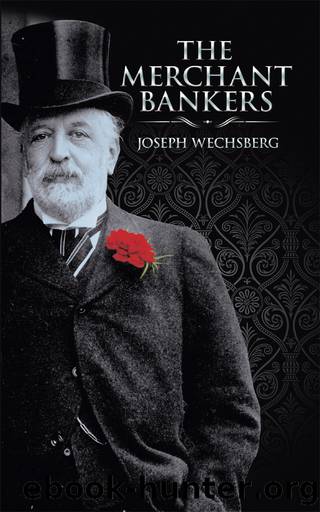The Merchant Bankers by Joseph Wechsberg Christopher Kobrak

Author:Joseph Wechsberg, Christopher Kobrak [Joseph Wechsberg, Christopher Kobrak]
Language: eng
Format: epub
Tags: Fiction & Literature, Literary Theory & Criticism
ISBN: 9781350317000
Publisher: Bloomsbury Publishing
Published: 2005-08-03T04:00:00+00:00
A TALE OF SEVERAL CITIES
A great many things have happened since 1798 when the brothers Moses Marcus and Gerson Warburg founded M. M. Warburg & Co. in Hamburg. Actually the familyâs banking tradition is much older and goes back to one Simon von Cassel, a sixteenth-century ancestor who was a pawnbroker and money-dealer. (The prefix âvonâ has merely a geographic, not aristocratic, meaning; it denotes that Simon came von or from Cassel.) In 1559 Simon obtained permission to settle in the Westphalian town of Warburg from which the family later took its name. (Warburg, population 9500, is known for a twelfth-century âdouble churchâ with a Romanesque foundation, and a thirteenth-century church, St.-Maria-in-vinea.) This gives the Warburgs a clear historical lead over such early merchant-banking upstarts as the Barings who began their activities as late as 1717 m Exeter, and over the Rothschilds who became court factors to His Serene Highness Prince William, Landgrave of Hesse Cassel, and started doing business only after 1785.
Some Warburgs were known to have lived in the sixteenth century in Altona, near Hamburg. Altona was at that time under Danish rule. There the Jews â who gained full rights as citizens in Hamburg only in 1849 â were allowed to be active as merchants and shipowners. One of the Altona Warburgs, Marcus Gumprich Warburg, moved in 1773 to Hamburg where the situation had become a little easier for Jewish merchants and bankers. He was the father of the two brothers who founded M. M. Warburg & Co.
Their timing wasnât very good. The year before, in 1797, the Bank of England had stopped its cash payments. Hamburgâs trade in commercial bills had suddenly expanded, which created grave credit risks. Like London, Hamburg owes its commercial prominence to its port which then connected northern Europe with the Atlantic and the Mediterranean, and made Hamburg a fine base for merchant adventurers and bold entrepreneurs. Hamburgâs status as a neutral, free city was another big asset. In time of war, Hamburgâs merchants could, and did, trade with all belligerent parties. This aspect of neutrality has not changed in our day and makes neutrals suspect to others, who would like very much to be neutral themselves.
The new bank was less than one year old when, in 1799, the boom suddenly collapsed. Large overseas supplies had arrived in Portugal, England and Scandinavia, and there were sharp price breaks. In Hamburg alone over a hundred and fifty firms went bankrupt.
The Warburgs had been cautious and rode out the storm. In 1806 the French troops occupied Hamburg and seized some of the more substantial citizens as hostages. Among them was Gerson Warburg who was interned in Rothenburg, a small place in the Lüneburger Heide. According to a cherished Warburg family story, Gersonâs brother Moses who had often quarreled with Gerson was rather reluctant to pay the high sum demanded by the French for his brotherâs release. He had to be severely admonished by the Jewish community before he agreed to redeem his brother. Even then he made a deal with the French and paid much less for Gerson than they had demanded.
Download
This site does not store any files on its server. We only index and link to content provided by other sites. Please contact the content providers to delete copyright contents if any and email us, we'll remove relevant links or contents immediately.
Guns, Germs and Steel by Diamond Jared(2365)
Collapse: How Societies Choose to Fail or Succeed by Jared Diamond(1513)
The Emperor of All Maladies by Siddhartha Mukherjee(1438)
Transcendence by Gaia Vince(1139)
148424513X by Unknown(1077)
Seven Skeletons by Lydia Pyne(1066)
Civilization One by Christopher Knight(1003)
Sapiens - A brief history of humankind (Marathi) by Yuval Noah Harari(989)
The Rational Optimist: How Prosperity Evolves by Matt Ridley(965)
THE MASTER AND HIS EMISSARY by Iain McGilchrist(941)
Guns, Germs, and Steel: The Fates of Human Societies by Jared M. Diamond(927)
At Home by Bill Bryson(909)
How the Irish Saved Civilization by Thomas Cahill(895)
Marco Polo by Laurence Bergreen(892)
Underworld The Mysterious Origins of Civilization by Graham Hancock(891)
Atrocitology by Matthew White(878)
Ancient Iraq by Georges Roux(859)
The World Until Yesterday: What Can We Learn From Traditional Societies? by Jared Diamond(847)
Guns, Germs and Steel: The Fates of Human Societies by Jared Diamond(841)
